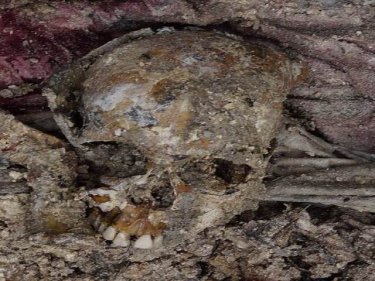The shock find follows the discovery of similar mass graves in Thailand early in May, which prompted Thai authorities to crack down on human trafficking networks.
Malaysia has previously denied that people smuggler camps or graves were located on its territory, the destination of choice for tens of thousands of Rohingya fleeing persecution in Myanmar that has prompted a humanitarian crisis across the Bay of Bengal and in South-east Asian waters.
The Mingguan Malaysia newspaper reported that graves were found in mid-May in forests in Padang Besar and Wang Kelian, but the government in Kuala Lumpur did not announce the discoveries.
The newspaper also reported that several foreigners and local villagers had been arrested under anti-trafficking and anti-smuggling laws.
For years Malaysia has quietly allowed tens of thousands of Rohingya and Bangladeshis who had been smuggled into the country by human traffickers to work as cheap labor.
Many had been held in jungle camps and in boats at sea while traffickers demanded ransoms from their families.
Thailand's crackdown forced traffickers to abandon their human cargo, leaving thousands stranded at sea as Malaysia, Thailand and Indonesia pushed their boats back from their shores.
But Malaysia and Indonesia last week reversed their policy amid international outrage over the plight of the migrants and asylum seekers, many of whom were starving and in need of urgent medical attention.
Late last week Malaysian Prime Minister Najib Razak ordered his navy and coast guard to comb the sea looking for up to 6000 people still stranded.
Malaysia has also agreed to attend a Thai-hosted summit of regional nations, including Australia, to discuss the crisis next Friday.
South-east Asian nations will be under pressure to set up temporary camps to shelter the migrants. The United States has said it would help build the camps and resettle some of the migrants.
But Thailand's military government, which treats Rohingyas and Bangladeshis as illegal immigrants and jails them, has said it is worried that establishing camps will cause more people to flee Bangladesh and Myanmar.
Meanwhile, the Royal Thai Armed Forces have rejected a US request to use the Thai resort island of Phuket as a maritime patrol base to assist Rohingya migrants, the Sunday Bangkok Post reports.
The Post quoted an unnamed source saying the rejection reflects Thai irritation over US pressure to resolve human trafficking problems.
Since early May Thailand has arrested 46 people, many of them local politicians and officials, on human trafficking charges and have issued warrants for the arrest of 77 more suspects.
WATCH How Trafficking Works
Phuketwan Investigative reporter Chutima Sidasathian, still being sued for criminal defamation over a Reuters paragraph: ''It's worse and worse, day by day. Nobody cares''.
http://journeyman.tv/67116/short-films/rohingya-hd.html
LISTEN The Rohingya Solution
A tragedy almost beyond words has been unfolding in Thailand, where a human smuggling network is thriving with the full knowledge of some corrupt law enforcement officers. Alan Morison of Phuketwan talks to Australia's AM program.
http://www.abc.net.au/am/content/2015/s4231108.htm





It is what was suspected for a long time, as there was suspicious silence on what is going on other side of the border.
It warrants full-scale international investigation , since authorities, incl. enforcement ones, are complicit in these crimes.
Posted by Sue on May 24, 2015 14:50